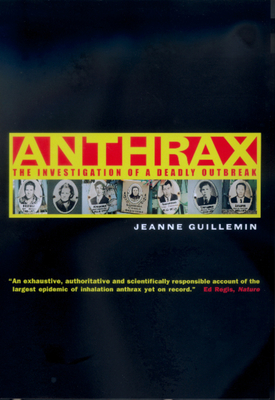

 University of California Press
University of California Press
Anthrax: The Investigation of a Deadly Outbreak


Key Metrics
- Jeanne Guillemin
- University of California Press
- Paperback
- 9780520229174
- 9.02 X 6.02 X 0.91 inches
- 1.06 pounds
- History > Russia & the Former Soviet Union
- English
 Secure Transaction
Secure TransactionBook Description
Anthrax is a virulent and deadly bacteria whose spores can remain in soil for as long as seventy years, killing grazing animals and putting humans in jeopardy of eating infected meat. Contemporary concern is more centered on anthrax as an airborne biological weapon whose inhaled spores can result in ninety percent mortality for those infected.
As part of a team of doctors and researchers, Jeanne Guillemin traveled to Russia in 1992 to determine the cause and extent of the epidemic. Her affecting narrative transforms a case of epidemiological investigation into a politically charged mystery. She creates a vivid sense of immediacy and drama with her insider's account of the team's investigative work-the analysis of pathology photos and slides, meetings with political and public health officials, the retrieval of essential medical data-and candidly reveals the subjective side of science as she conducts interviews with afflicted families, visits sites, and interacts with those suspected of clouding the truth.
Complete with medical case information and three epidemiological maps, this classic account relates directly to growing concern over bioterrorism and how the United States and other nations should respond. In the final chapters Guillemin surveys past and present covert biological weapons arsenals scattered around the world and the international legal efforts to eliminate them.
Author Bio
Jeanne Guillemin, a medical anthropologist and biological warfare expert, died on Nov. 15, 2019, at her home in Cambridge, Massachusetts. She was 76.
Guillemin received her bachelor’s degree in social psychology from Harvard University in 1968 and her doctorate in sociology and anthropology from Brandeis University in 1973. She was a professor of international relations and anthropology at Boston College, where she taught for 33 years.
From 2006 until her death, she served as a senior advisor to the MIT Security Studies Program (SSP).
As well as being a researcher at HSP, Jeanne Guillemin is a Senior Advisor at the MIT Security Studies Program in Cambridge, Massachusetts, within the Center for International Studies. For many years she was a professor of medical sociology at Boston College, where she taught courses on field methods, military medicine, and the social construction of risk and danger.
The early 1980s saw the beginning of her involvement in team-based research on international biological weapons controversies. The first was the alleged Soviet-backed use of mycotoxins in Southeast Asia (dubbed "yellow rain" by the press), for which she provided analysis of interviews with purported victims and eventually co-authored articles with Matthew Meselson and Julian Perry Robinson and other project researchers.
Her next research effort in this area concerned the post Cold War 1979 anthrax outbreak in the city of Sverdlovsk (USSR). Her book, Anthrax: the investigation of a deadly outbreak (University of California Press, 1999) describes this field project, which was led by Matthew Meselson. During the crisis caused by the US 2001 anthrax postal attacks, Guillemin appeared regularly as a commentator on the national media and has been engaged in the controversy surrounding the US Bioshield program to research select agents. Her most recent book, Biological Weapons: from the invention of state-sponsored programs to contemporary bioterrorism (Columbia University Press, 2005) is a comprehensive overview of the development of these weapons and includes a summary of relevant contemporary policy.
Her latest research project, supported by the Carr Center for Human Rights at Harvard, concerns the potential conflict between national security policy and the universal protection of vulnerable populations from biological weapons. Her specific focus is the Japanese Imperial Army's biological weapons program in China (1934-1945) and the role of US national security interests in suppressing public knowledge of war crimes committed under that program.
Source: MIT News - Jan 7, 2020, The Harvard Sussex Program
Videos
No Videos
Community reviews
Write a ReviewNo Community reviews